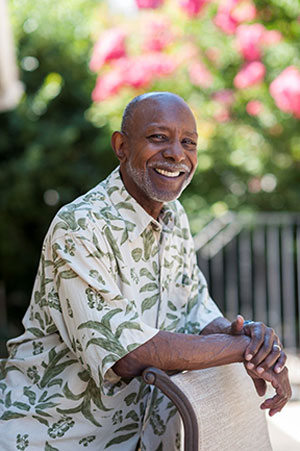Len, living with ATTR

Len rarely passes up an opportunity for a new adventure. A world traveler with a passion for experiencing different cultures, he’s visited hundreds of countries and has dozens more on his list. But Len never expected the adventure he is on today — a journey that began in 2007, at the age of 64, with an unexpected diagnosis of a rare disease called transthyretin amyloidosis or ATTR.
“This is something you don’t sign up for, and it’s not easy” says Len. But despite the hardships, he has found a way to continue to live an active life and play an essential role in supporting other patients, putting his positivity to good use.

As Len remembers well, he was in the middle of a step aerobics class when he began experiencing the first signs of trouble: heart palpitations and dizziness. The symptoms were odd, as he and his wife Karen would exercise together four or five times per week and he never had any trouble keeping up with their vigorous routine.
He made an appointment with his family doctor, where an irregular heart beat prompted an urgent visit with a cardiologist. There, the evidence of ATTR became more apparent.
“I had an enlarged heart and thickened walls, so I was referred to a hematologist at Mayo Clinic,” Len says. “The first thing he asked me was: ‘is there any family history of amyloidosis?’”
The answer was yes. Len’s mother had both amyloidosis and Alzheimer’s. And while the latter seemed to garner more medical attention, Len slowly began to realize the former probably played the biggest role in her declining health before she passed away. Further tests confirmed that Len did indeed have hereditary amyloidosis, which was affecting his heart function. He learned he had the most common genetic variant of ATTR cardiomyopathy, Val122Ile or V122I. Approximately 4% of African Americans carry the V122I variant and Len was one of them.
Len’s form of the disease is often abbreviated as vATTR-CM, which usually manifests later in life. Over time, misfolded proteins accumulate in the heart, causing toxicity and life-threatening damage. When he was diagnosed, there was no FDA-approved treatment, which meant that Len would need a heart transplant to survive.
On March 8, 2008, Len’s name was added to the heart transplant list. And just about three months later, on June 10, his cardiologist called him with the good news: a healthy heart was waiting for him. Len headed straight to hospital. When he emerged from more than 11 hours of surgery, his new heart was beating so hard that it shook his hospital bed—even his wife could feel it. “What an experience,” he says.
On Christmas Eve of that year, almost exactly six months after the transplant, Len received a letter in the mail from the donor’s family. “The donor’s mother included pictures of her son and the rest of the family, along with the donor’s son, who was three-years-old at the time,” he says. “It was pretty dramatic.”
In the decade since his transplant, Len has made good use of his heart—living life to its fullest and giving back whenever he can. He and his wife have visited more than 71 countries and he has learned to handle the many strong emotions that come with having a disease without a cure. “The one thing my doctors have not told me is how long it would be before my new heart would be affected by the disease,” says Len, who continues to takes heart medicines to stay as healthy as possible. “They don’t have enough examples to be able to discern that.”
Len also connected with a college friend who coincidentally has the same form of the disease, and he is closely involved in a support group of amyloidosis patients, where he realizes how fortunate he was to have doctors who helped him find a diagnosis so quickly.
“New patients show up to the support group and are just devastated because they don’t know what to do or expect,” Len says. “Some of these folks are going to multiple doctors to get a diagnosis and are really afraid of this disease and what the future holds. It’s encouraging to know that companies are working to create a medication that might help prevent or slow down the disease.”
Len passed away from complications caused by ATTR in 2023.